Integrated space and ground network to weave a 'safety net' for the intelligent era in telecom security
![]() 09/03 2024
09/03 2024
![]() 551
551
At present, the tide of new technologies is surging, and the wave of intelligence is sweeping across the globe. As technology continues to iterate and upgrade, the tide sometimes rages like a storm, eroding human imagination and industry boundaries; at other times, it remains calm and serene, allowing people to sense the infinite possibilities brought about by intelligent technology. In the era of intelligence, every new technological change holds enormous opportunities while also presenting numerous unknown challenges.
On September 1, the “China Telecom Network Security Promotion Month Launch and Telecom Security China Tour · Suzhou Station Event” with the theme of “Leading Safely, Embracing Intelligence” was held. Gu Haidong, Member of the Standing Committee of the Suzhou Municipal Party Committee and Executive Deputy Mayor, Sui Jing, Director of the Cybersecurity Administration Bureau of the Ministry of Industry and Information Technology, Liang Baojun, General Manager of China Telecom, Li Jun, Deputy General Manager of China Telecom, Liu Ziqian, General Manager of Tianyi Security Technology Co., Ltd., and other attendees discussed in-depth the path to digital security under the new situation. By exploring new avenues and building a new ecosystem, they aim to promote the integrated development of digital security with emerging industries such as artificial intelligence, space-ground integration, and low-altitude economy, jointly outlining a new security landscape.
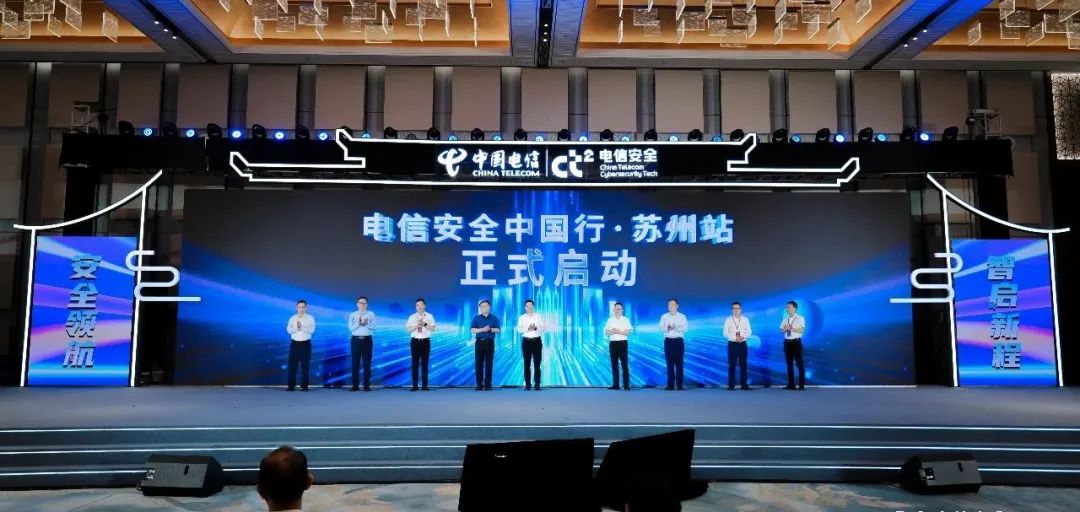
01
Strengthening the digital foundation and continuously pushing the boundaries of industrial security
Over the past three decades, digital technology has continuously iterated and upgraded, from the internet and big data to artificial intelligence, gradually expanding from a two-dimensional network on the ground to a three-dimensional network spanning air, space, and the earth, ultimately realizing an integrated “intelligent ubiquitous” network. The wave of technology has significantly altered the connotation and extension of security issues. Nowadays, the low-altitude economy, a strategic emerging industry prioritized in China, represents a typical example of new productivity. In November last year, the Central Economic Work Conference identified several strategic emerging industries, including biomanufacturing, commercial aerospace, and the low-altitude economy. In March this year, the low-altitude economy was included in the government work report for the first time, once again highlighting its importance in the country's economic development. According to the “Report on the Development of China's Low-Altitude Economy (2024)” by the CCID Research Institute of the Ministry of Industry and Information Technology, China's low-altitude economy reached a scale of RMB 505.95 billion in 2023, with a growth rate of 33.8%, and is expected to reach RMB 2 trillion by 2030. The low-altitude economy extends human daily vision and activities from two dimensions to three, raising new security concerns that necessitate reshaping the security system from an overall security perspective.
As a voluntary flying economic activity, the low-altitude industry blurs the relative boundaries between public airspace and private territories. When low-altitude aircraft are widely used in transportation, surveying and mapping, aerial photography, evidence collection, logistics, and other professional fields, they enable easy access to precise information about certain locations, such as institutional locations, institutional behavior data, and personal behavior data. This also makes it easier to monitor and eavesdrop on people's activities, especially in private spaces like residential and commercial areas. Low-altitude aircraft typically transmit data and control signals through wireless communication networks, posing risks of eavesdropping and interference. Unauthorized access or misuse of personal behavior data and key location-related data can pose serious threats to personal privacy and social security. Furthermore, from a flight safety perspective, low-altitude airspace is significantly influenced by ground conditions and climate variability. As drones and flying cars become more prevalent, the risks of air congestion, collisions, and threats to ground facilities and pedestrians brought about by unsafe factors are self-evident. Therefore, higher technical safety standards are required for low-altitude aircraft. The complexity, dynamics, and uncertainty of the low-altitude environment necessitate a high level of intelligence in low-altitude aircraft, involving the integration of multi-sensory systems, artificial intelligence, control theory, and operations research. To further address critical security challenges in low-altitude airspace and low-altitude aircraft, China Telecom has established a Low-Altitude Security Laboratory. By studying the signal and spectrum characteristics of drones, the laboratory develops advanced detection, identification, location, and countermeasures equipment, reinforcing low-altitude security for sensitive areas, important venues, and special facilities. Information infrastructure is a prerequisite for the deep integration of the real economy and digital economy.
Recently, Jin Zhuanglong, Minister of the Ministry of Industry and Information Technology, emphasized the importance of moderately advancing the deployment of information infrastructure. The “14th Five-Year Plan for Digital Economic Development” also clearly states the need to build an intelligent, comprehensive digital information infrastructure that is ubiquitous, integrated with space and ground networks, cloud and network-fused, intelligent and agile, green and low-carbon, and secure and controllable. Currently, abundant spatial information resources have become a crucial factor in national development and progress. Against this backdrop, an integrated space-ground network based in China has gradually emerged and developed. However, due to the highly heterogeneous and dynamically complex nature of its network structure, there are significant differences between space-based and ground-based networks in terms of communication bandwidth, processing capabilities, and hardware scalability, resulting in vulnerabilities in the overall network architecture. To better address critical security issues such as uncontrolled, highly dynamic, and resource-constrained environments in space-ground integrated internets, China Telecom has established a Space-Ground Integrated Security Laboratory. Supported by national key research and development projects, the laboratory will conduct in-depth research on active adaptive security technologies for space-ground integrated internets.
Through innovative research, such as space-ground collaborative and cloud-network integrated active DDoS defense technologies, DDoS attack tracing technologies based on beam search algorithms, and space-ground integrated internet security resource orchestration strategies and ECC-based satellite network node mutual trust and collaborative verification mechanisms, the laboratory has successfully overcome the limitations of traditional security models in terms of centralized monitoring in fixed topologies, satellite-ground mutual recognition, and flexible security needs fulfillment.
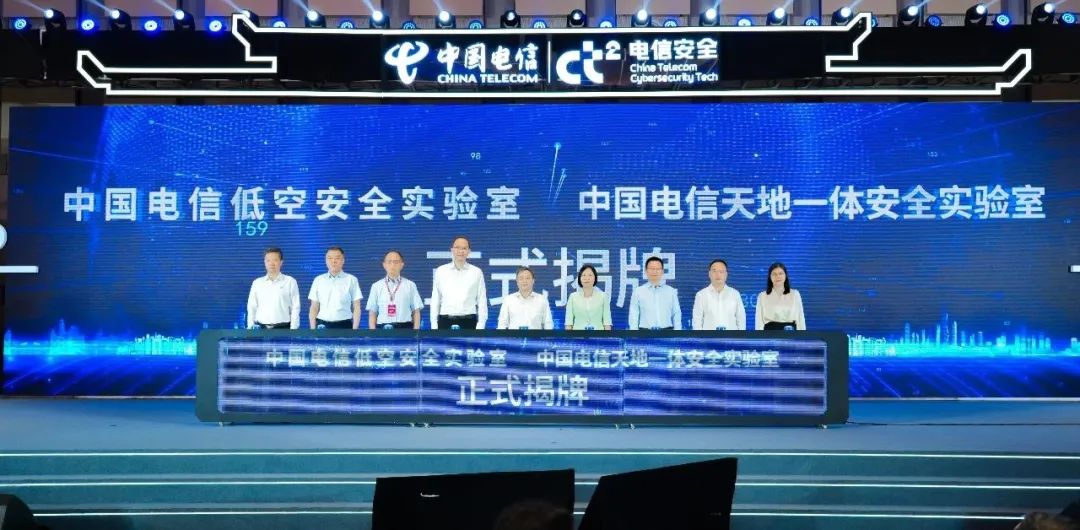
In the future, the Space-Ground Integrated Security Laboratory will continue to promote technological innovation and development by joining forces with industry, academia, and research partners. By strengthening national and corporate security defenses in the digital era, it will contribute to strategic layouts in aerospace communications and national defense security, playing a pivotal role in realizing China's national cyberpower strategy. With the implementation of a series of new infrastructure policies, the acceleration of new infrastructure construction, including 5G, data centers, and industrial internets, is underway across various industries. The further integration of cyberspace and physical space, characterized by the Internet of Everything, human-computer interaction, and space-ground integration, means that cyberattacks will directly infiltrate the physical world, impacting people's lives, social stability, and national security. Cybersecurity is an indispensable safeguard for new infrastructure, underscoring the necessity of enhancing cybersecurity efforts in tandem with new infrastructure development.
As the mainstay and backbone force in building a secure enterprise for China Telecom, Telecom Security integrates the cloud network, security, and data resources and capabilities of the China Telecom Group through an integrated R&D and operation approach. It provides various security products and services, including cloud network security, data security, and information security, to both internal and external customers, serving as a crucial research force for the security of national critical infrastructure.
In recent years, Telecom Security has continuously driven innovation in digital security key technologies and extensively collaborated to strengthen its security capabilities. By continually reinforcing and enhancing its security capabilities, it provides more reliable security guarantees to users while actively contributing to the development of China's cybersecurity industry. At this event, the Suzhou Big Data Group Co., Ltd., and Tianyi Security Technology Co., Ltd., jointly established Suzhou Shuzheng Security Technology Co., Ltd. Focusing on empowering digital government and digital industries, the company aims to become an integrated security capability service provider for “cloud, network, data, application, and endpoint,” further enhancing the level of network security services for Suzhou's government and enterprise customers and boosting the development of Suzhou's cybersecurity industry.
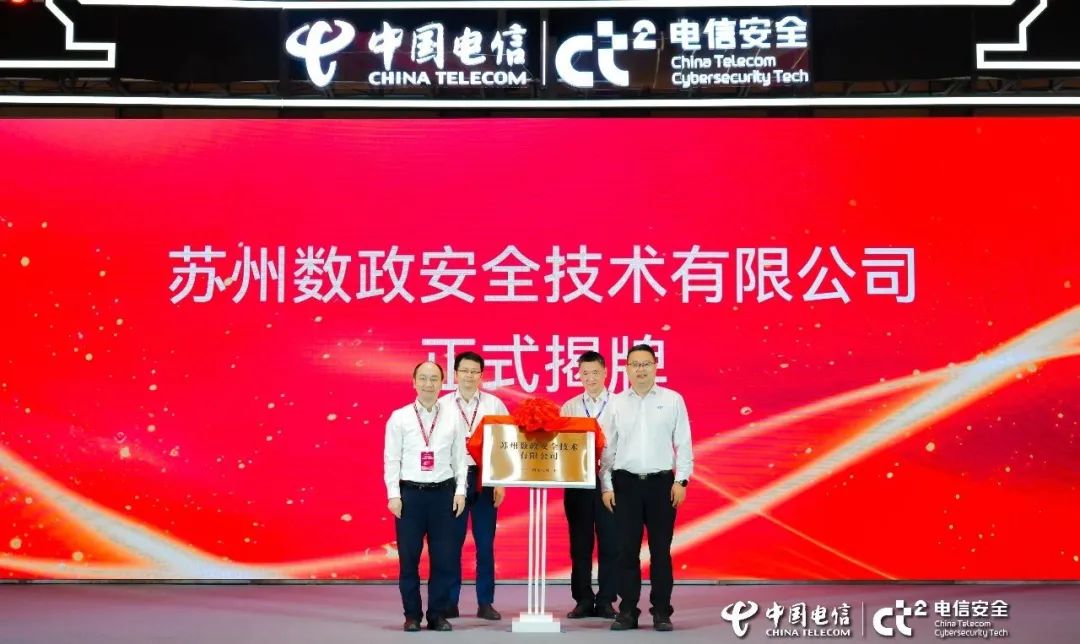
Regarding digital security, China Telecom has continuously explored and practiced architectural, endogenous, and native security in recent years, enhancing the robustness of cloud and network infrastructure and striving to become a reliable cybersecurity operator in the digital era. China Telecom pioneered the establishment of a cloud and network security platform within the industry, creating security capability pools covering 31 provinces (autonomous regions and municipalities directly under the central government) and providing diverse and flexibly orchestrated security atomic capabilities to achieve measurable, understandable, preventable, and controllable cloud and network security risks. It has also strengthened data security operation capabilities by independently developing a data security situation awareness system to ensure the secure and orderly circulation of data elements. Furthermore, it has established the “Cloud Great Wall,” the only network attack protection platform with nationwide coverage and global reach, providing more flexible cloud and network-integrated security monitoring and protection services to users. The Cloud Great Wall's anti-DDoS product has been included in the “SASAC's Manual of Central Enterprise Technological Innovation Achievements and Products (2023 Edition).”
In response to the surge of artificial intelligence development, China Telecom actively utilizes large security models to upgrade integrated products and operational services, enhancing users' sense of security in digital spaces. The Jianwei Security Large Model 2.0 boasts five key capabilities: intelligent offensive and defensive terrain analysis, intelligent alarm noise reduction and judgment, security service operation assistant, automatic report generation and interpretation, and large model guardrails. It improves enterprise security operation efficiency and has been successfully applied in multiple Telecom Security products and over a dozen provincial professional security service companies. The innovatively upgraded Telecom Data Shield 2.0, featuring a unique dynamic AI engine, enhances the accuracy of flowing data monitoring systems by over 50%.
02
Adhering to Long-Term Commitment to Unleash New Productive Forces in Digital Security
At the event, Liang Baojun, General Manager of China Telecom, expressed the company's commitment to implementing the vital thinking of building a cyberpower and upholding the overall national security concept. First, it will intensify technological innovation to enhance core capabilities in safeguarding cyber and information security. Second, it will promote industry-academia-research ecological cooperation to continuously generate new development momentum. Third, it will adhere to a bottom-line mindset and fortify security defenses. Going forward, China Telecom will continue to uphold the spirit of red telecommunications, solidify its fundamental security skills, remain committed to safeguarding cyber and information security, unwaveringly implement the overall national security concept, and further strengthen its core functions to support the strategic layout of advancing national rejuvenation through Chinese-style modernization.
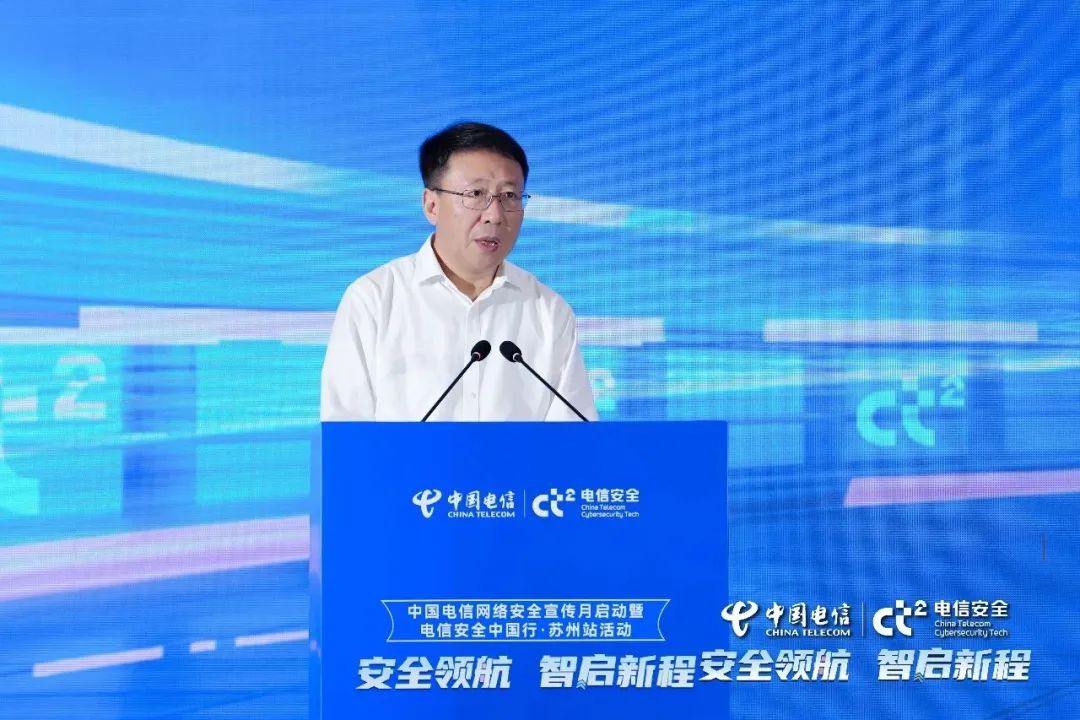
Liang Baojun, General Manager of China Telecom, and Liu Ziqian, General Manager of Tianyi Security Technology Co., Ltd., further summarized China Telecom's development journey and achievements in the security field. They expressed their aspiration to become a trusted cybersecurity operator in the digital era by continuously innovating technology and strengthening security capabilities. Liu Ziqian stated that China Telecom regards a secure enterprise as one of the critical elements for launching the entire group's construction during the “14th Five-Year Plan” period. Starting in 2014, China Telecom embarked on internal entrepreneurship focused on cybersecurity, established a cybersecurity product operation center in 2015, and formally corporatized its cybersecurity operations in 2021. After a decade of entrepreneurship and three years of corporatization, Telecom Security has grown into a company with thousands of employees, serving over 100,000 customers, and achieving a remarkable three-year compound annual growth rate of 50%. Over the past decade, under an integrated R&D, development, and operation mechanism, China Telecom has continuously leveraged its backbone network resource advantages, opening up its global IP backbone network. This enables the network to withstand large-scale attacks by relying on its extensive resources. Simultaneously, China Telecom has further strengthened its platform-based operation and service capabilities, helping customers create value through SaaS-based operational approaches across traffic, equipment, cloud networks, and data security operations.
Finally, by integrating industry chain partners and building a comprehensive industry ecosystem platform, China Telecom deeply integrates its capabilities with those of its partners to construct an operable, integrated, and deep-defense platform encompassing “endpoints, edges, networks, clouds, space, and data.” Liu Ziqian remarked, “Telecom Security Co., Ltd. was officially registered in Suzhou on September 9. Choosing this particular date conveys a message: security takes time and effort. Without a robust cybersecurity industry, national cybersecurity lacks support, and a strong national cybersecurity industry cannot thrive. We aspire to collaborate with security industry companies to strengthen and expand the national cybersecurity industry.”
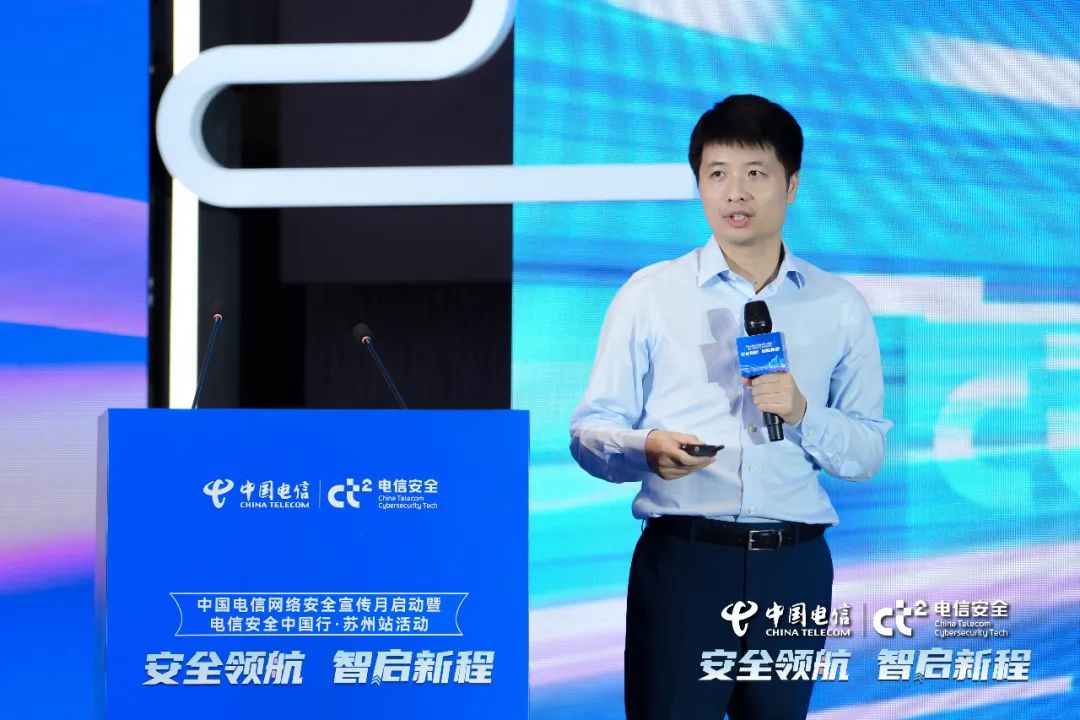
As the tide of technology surges forward, China Telecom not only comprehensively enhances its cybersecurity defense capabilities through technological innovation, providing robust technical support for the construction of Digital China, but also continuously improves its cooperation ecosystem by expanding open cooperation. Collaborating with local governments, research institutions, universities, and other partners, it contributes to building a new cybersecurity ecosystem and fortifying digital security barriers in the intelligent era.
【Original Reporting by Tech Cloud】
Please indicate the source as 'Tech Cloud Reporting' and include a link to this article when republishing.







